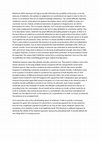Papers by Kahrn O Sanderson
In The Bloody Chamber Carter presents obsessive relationships against a backdrop of darkness.' To... more In The Bloody Chamber Carter presents obsessive relationships against a backdrop of darkness.' To what extent is this true?
Critically assess the claim that religious language is meaningless (35 Marks) Religious language ... more Critically assess the claim that religious language is meaningless (35 Marks) Religious language has been argued about by many philosophers with regards to whether or not the ways in which we speak about religion are meaningful. This issue of religious language is concerned with the methods by which man talks about God in conjunction with theist or atheist ideologies. For some, religious language is meaningful and full of purpose while others see it to being incomprehensible and pointless.
Although terrifying, many of the stories in the bloody chamber are darkly comic.' Consider at lea... more Although terrifying, many of the stories in the bloody chamber are darkly comic.' Consider at least two of the stories from 'The Bloody Chamber' in light of this view.
To what extent had the economy changed from 1951-2007? Britain changed drastically in almost ever... more To what extent had the economy changed from 1951-2007? Britain changed drastically in almost every area between 1951 and 2007, and the economy is no exception. It transitioned from being reminiscent of a "wartime economy " in the 1950s, with austerity and state intervention, to a country of privatisation and high public spending with continuous economic growth in 2007. And yet, there are certainly areas of continuity, where themes which characterised the 1950s lingered on to haunt the 2000s. This essay will assess key factors such as trade union power, prosperity, and the state of industry. It will ultimately conclude that although Britain's economy changed radically throughout the period, several underlying problems of the 1950s were still present more than half a century later.

Relativism whilst seeming to be logical actually eliminates the possibility of discussion, as by ... more Relativism whilst seeming to be logical actually eliminates the possibility of discussion, as by the advocacy of relativism, the opinions or judgements of a professional are equal in value to that of a novice, or of someone who has no subject knowledge whatsoever. The central difficulty regarding relativism's case for moral good is its apparent descriptive nature and its inability to arrive at a conclusion, but are, instead, emotional expressions of approval or disapproval or are merely prescriptions for action. This is certainly enigmatic, for if a society was based upon relativist rules, how could a judgement be reached due to the lack of value attribution to a particular opinion. Due to its descriptive nature, relativism has great difficulty persuading people to do good, as there is in the basic theory of relativism no particular attribution of value to good actions if the theory itself is correctly followed. It can be argued that Relativism itself provides little conclusive reason to be good, as no opinion has any particular value, and thus it is always possible to defend an immoral action. There is also evidence to postulate the existence of certain moral absolutes which are independent of sociological situation, such as those postulated by Clyde Kluckhohn and Ralph Linton, these are untruth, murder, incest and unfair dealing. If someone was undecided on what morality to agree with, and merely chose what to believe in on the basis of philosophical strength, then there is little to support relativism, as there is much confusion about which particulars of moral relativism should be supported. This means that if relativism cannot form a convincing argument, how can it be used as justification for those committing good if upon analysis it breaks down.
Teaching Documents by Kahrn O Sanderson
The image and persona of Thatcher, one of zealous and almost fanatical conviction, was for many t... more The image and persona of Thatcher, one of zealous and almost fanatical conviction, was for many the resonating and resulting toughness of British society. Gone were the days where the subjects of the realm could look up to big government, and could finally many comment of a feeling of freedom of independence from the state, with the sweet smell of individual thrift and hard work. This is a vulgar overstatement and simply inaccurate. Thatcher presided over a period whereby social alienation and polarisation, through her divisive economic policies, created a helpless and individualistic society, not one that was "tough" and resilient.








Uploads
Papers by Kahrn O Sanderson
Teaching Documents by Kahrn O Sanderson